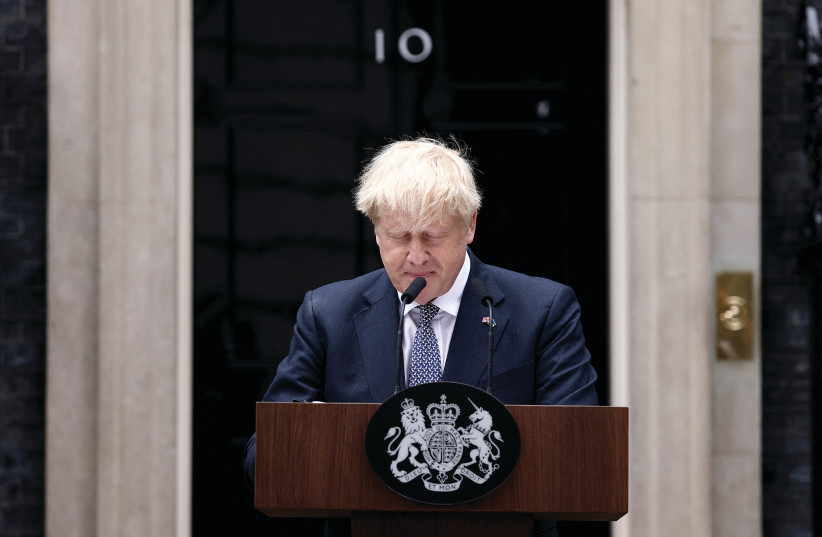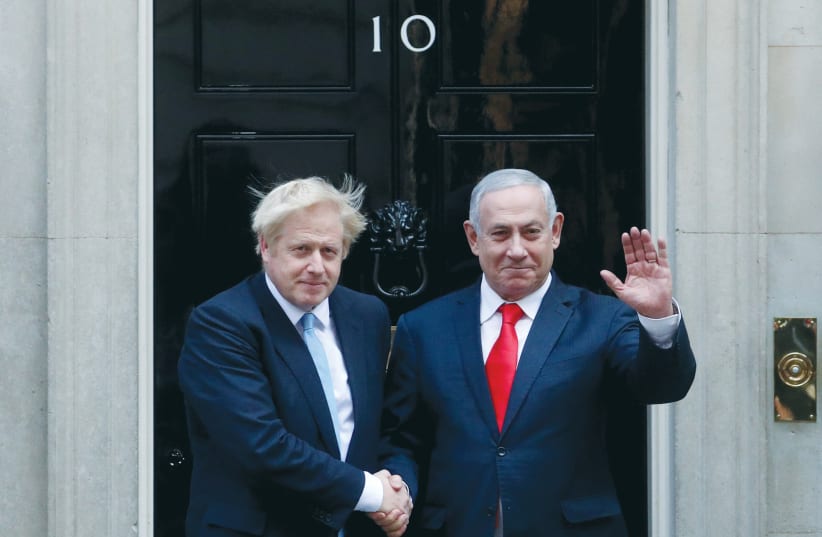British Prime Minister Boris Johnson will end his term at 10 Downing Street this coming week, to be replaced by either foreign secretary Liz Truss or former chancellor Rishi Sunak. Boris leaves office with his political reputation much besmirched. But for all his failings, he was, and remains, a self-declared friend of the Jewish state.
As Israel’s ambassador to the UK (2016-2020), when I would meet Boris, he would routinely profess his affection for Israel, often recalling with a smile the time he spent in 1984 as a volunteer on Kibbutz Kfar Hanassi in the Upper Galilee.
Apparently, Boris spent three weeks there washing dishes in the communal dining room. A rather short stay for a volunteer, the kibbutzniks recall him saying, “I am having a great time here, but I want to see the entire country.” A badly sunburned Boris then left to tour Israel.
Barring the unlikely possibility that, like former US president Jimmy Carter, Boris devotes his post-government career to building homes for the global poor, future biographers may write that his brief time in Israel washing dishes was his sole lifetime experience of manual labor.
In November 2015, Boris came back to Israel as London’s mayor. During that visit, journalists questioned him about those in the UK calling for a boycott of Israel. In a not-untypical Boris one-liner, he dismissed the boycotters as “corduroy-jacketed, snaggle-toothed, lefty academics.” The Palestinians took offense and canceled his scheduled meetings in the PA.


Considering that Boris went on to become foreign secretary and prime minister, it was not a very smart move by the Palestinians to voluntarily relinquish the chance of influencing a rising political star. But as the Abba Eban cliché goes – they never miss an opportunity to miss an opportunity.
How Boris Johnson made a difference for UK-Israel ties
When prime minister Theresa May named Boris as foreign secretary in 2016, many thought it a strange pick, the splashy Boris not necessarily a natural choice for Her Majesty’s chief diplomat. Yet my contacts assured me that his appointment would be good for the Anglo-Israel relationship. This assessment proved accurate: I witnessed at least two occasions in which he made a difference.
The first event was the Balfour Centenary. November 2017 marked the 100th anniversary of the Balfour Declaration when, as the First World War raged, Great Britain promised its support for Zionist aspirations and came out in favor of the establishment of a national home for the Jewish people.
The Palestinians and their UK supporters demanded that Britain use the centenary to atone, calling on London to publicly acknowledge that British support for Zionism had been a terrible mistake inaugurating a “century of injustice.” They did not merely seek a formal governmental apology, but insisted that to make amends, Britain should grant official recognition to the PLO’s self-declared State of Palestine.
By contrast, Israelis, British Jews, and Israel’s many UK friends sought a public celebration of the occasion, urging London to embrace Britain’s historic support for Zionism and to champion the contemporary Anglo-Israel partnership.
IN RESPONSE to these conflicting appeals, Whitehall produced an artful compromise. Tobias Ellwood MP, then-Under Secretary of State for the Middle East, dutifully informed Parliament of the Foreign Office’s position: Britain would neither apologize nor celebrate.
But if the initial position was a fudge, the UK’s prime minister and foreign secretary were apparently having none of it. Israeli prime minister Benjamin Netanyahu was officially invited by the British government to come to the UK on the centenary. May hosted him for lunch at Downing Street and that evening he attended a celebratory banquet at London’s prestigious Lancaster House, with both May and Johnson in attendance.
“I am proud of Britain’s part in creating Israel.”
Boris Johnson
At the time, Boris wrote: “I am proud of Britain’s part in creating Israel.” While reiterating the UK’s support for a two-state solution, Boris praised the Balfour Declaration for its “incontestable moral goal: to provide a persecuted people with a safe and secure homeland,” adding that he cherished the UK’s “indispensable” role in the “creation of a great nation.”
The second event of note was connected to the royal family. Despite the strength of the Anglo-Israel relationship, when I took up my posting in April 2016, no senior British royal had ever made an official visit to the Jewish state.
Prince Philip, Queen Elizabeth’s husband, had made private visits to the grave of his mother, Greek Princess Alice, who is interred at the Russian Orthodox Church of St. Mary Magdalene on the Mount of Olives (Alice was recognized by Yad Vashem as Righteous Among the Nations for saving a Jewish family during the Holocaust).
Prince Charles, the heir to the throne, had been in Israel for the funeral of prime minister Yitzhak Rabin in November 1995 and came again in September 2016 for the funeral of former president and prime minister Shimon Peres.
But in diplomatic parlance, neither Philip’s nor Charles’s trips counted as a stand-alone official visit that provides the requisite ceremonial endorsement of a true bilateral friendship with the UK. Indeed, for decades, despite numerous royal forays across the Arab world, the longstanding shunning of Israel persisted.
In Britain, royals do not make official visits abroad without first receiving the guidance and approval of the Foreign Office. When Israeli ambassadors raised this ongoing snub of Israel, as they did on numerous occasions, officials politely told them: “It is not the right time” – it never being clear when “the right time” would be.
In June 2018, under Boris’s leadership of the Foreign Office, the taboo was finally broken when Britain’s future king, Prince William, paid an official visit to Israel. Even then, last-minute differences threatened to cast a shadow over the trip, possibly forcing a postponement. However, following a discrete Bibi-Boris conversation, the problem was expeditiously solved, and William’s visit was a great success.
Of course, Israel was not enamored with everything Boris did. In December 2016, for example, despite prior Israeli representations to London, Britain angered Israel by voting for a UN Security Council resolution condemning Israeli construction in the West Bank and east Jerusalem (the US abstained).
Such difficulties notwithstanding, Boris always reassuringly professed to being on Israel’s side – and, if we take them at their word, so too are Truss and Sunak (though neither has kibbutz dishwashing experience). Accordingly, the good news is that irrespective of who wins this week’s Tory leadership contest, Israel will continue to have a self-declared friend in Number 10.
The writer, Israel’s ambassador to the UK between 2016 and 2020, is the chair of the Abba Eban Institute for Diplomacy at Reichman University. Follow him at @MarkRegev on Twitter.
